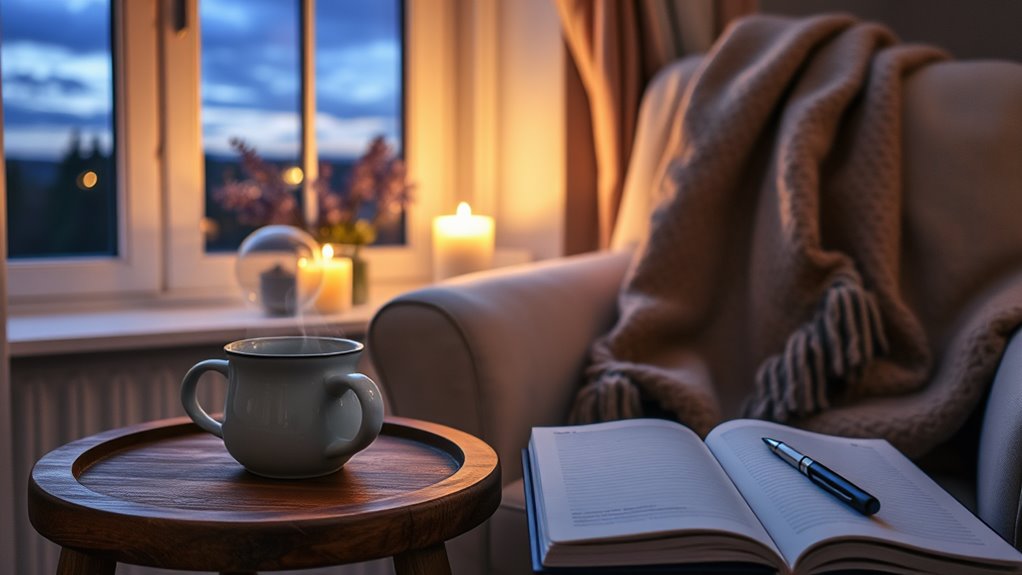Evening Routines That’ll Leave You Feeling Recharged by Morning
To feel recharged by morning, establish a calming evening routine. Start by dimming the lights and decluttering your space, creating a peaceful atmosphere. Limit screen time at least an hour before bed, and engage in mindfulness or gentle yoga to unwind. Incorporate soothing scents like lavender, and consider journaling to reflect on positives from the day. Stick to a consistent bedtime to help regulate your sleep cycle. Keeping your routine enjoyable will make it easier to maintain. Implementing these steps can greatly improve your overall well-being and set you up for a successful tomorrow. There’s more to explore that can enhance your evenings.
Key Takeaways
- Establish a consistent bedtime to regulate your internal clock and improve sleep quality.
- Engage in gentle yoga or stretching to release tension and prepare your body for rest.
- Limit screen time at least one hour before bed to enhance mental calmness and promote better sleep.
- Create a relaxing environment with dim lighting and soothing scents to foster tranquility.
- Practice mindfulness meditation or journaling to reflect on the day and cultivate a positive mindset.
Importance of Evening Routines
Evening routines play an essential role in winding down after a busy day, as they help you shift from the chaos of daily life to a state of relaxation.
Establishing a consistent routine signals to your body that it’s time to change from activity to rest. This practice not only enhances your mood but also improves your sleep quality, making you feel more energized the next day.
By incorporating activities you enjoy, like reading or meditating, you create a peaceful environment that supports your well-being.
In addition, evening routines can help you reflect on the day, allowing you to process your thoughts and emotions.
Ultimately, prioritizing this time for yourself fosters a sense of control and prepares you for a productive tomorrow.
Science-Backed Wind-Down Techniques
As you prepare to unwind, incorporating science-backed techniques can considerably enhance your relaxation process.
Start by limiting screen time at least an hour before bed; the blue light from devices can interfere with your sleep hormones. Instead, consider reading a book or practicing mindfulness meditation to calm your mind.
Engaging in gentle stretching or yoga can also help release tension in your body. Aromatherapy, using calming scents like lavender, can further promote relaxation.
If you enjoy journaling, take a few minutes to jot down your thoughts, which can help clear your mind.
Finally, establish a consistent bedtime to regulate your body’s internal clock. These techniques can set the stage for a peaceful night’s sleep and a refreshed morning.
Creating a Relaxing Environment
To create a relaxing environment, focus on elements that promote comfort and tranquility.
Start by decluttering your space; a tidy room can greatly reduce stress. Dim the lights or use soft lamps to create a warm glow that invites calmness. Incorporate soothing scents, like lavender or chamomile, through candles or essential oils to enhance relaxation.
Choose cozy textures, like soft blankets and plush pillows, to make your space inviting. If possible, play gentle background music or nature sounds to drown out distractions.
Finally, consider adding plants or flowers to bring a touch of nature indoors. By paying attention to these details, you’ll cultivate a soothing atmosphere that helps you unwind and prepares you for a restful night’s sleep.
Evening Activities to Promote Sleep
Engaging in calming activities before bed can greatly enhance your ability to fall asleep.
Try setting aside time for gentle yoga or stretching; these movements help release tension from the day.
Consider reading a book, preferably something light and enjoyable, to shift your mind away from daily stresses.
You might also enjoy journaling about your day, focusing on gratitude or positive experiences, which can create a peaceful mindset.
Dim the lights and listen to soothing music or nature sounds to further relax your body and mind.
Ultimately, avoid screens an hour before bedtime; the blue light can disrupt your sleep cycle.
Tips for Consistent Success
While establishing an evening routine can be beneficial, consistency is key to reaping its full rewards. Start by setting a specific time for your routine each night. This helps your body recognize when it’s time to wind down.
Keep your activities simple and enjoyable; whether it’s reading, journaling, or meditating, choose what you love. Limit distractions by turning off screens an hour before bed, creating a peaceful environment.
Track your progress with a journal to hold yourself accountable and note what works best. If you miss a night, don’t stress—just get back on track the next day.
Frequently Asked Questions
What Time Should I Start My Evening Routine?
You should start your evening routine about two hours before you plan to sleep. This gives you enough time to unwind, reflect on your day, and prepare your mind and body for restful sleep.
Can I Adjust My Routine on Weekends?
Absolutely, you can adjust your routine on weekends! It’s a great opportunity to relax or engage in activities you love. Just make sure to maintain some consistency to keep your overall rhythm intact.
How Long Should My Evening Routine Last?
Your evening routine should ideally last between 30 to 90 minutes. This gives you enough time to unwind, reflect on your day, and prepare for tomorrow without feeling rushed or overwhelmed. Tailor it to suit you.
What if I Have Trouble Sticking to a Routine?
If you’re having trouble sticking to a routine, start small. Focus on one or two activities you enjoy. Gradually build up as you gain confidence, and be flexible—it’s okay to adjust your routine as needed.
Are There Any Evening Routines for Kids?
Yes, there are plenty of evening routines for kids! You can create a calming atmosphere by reading together, setting a consistent bedtime, limiting screen time, and encouraging relaxation techniques like deep breathing or gentle stretching.



